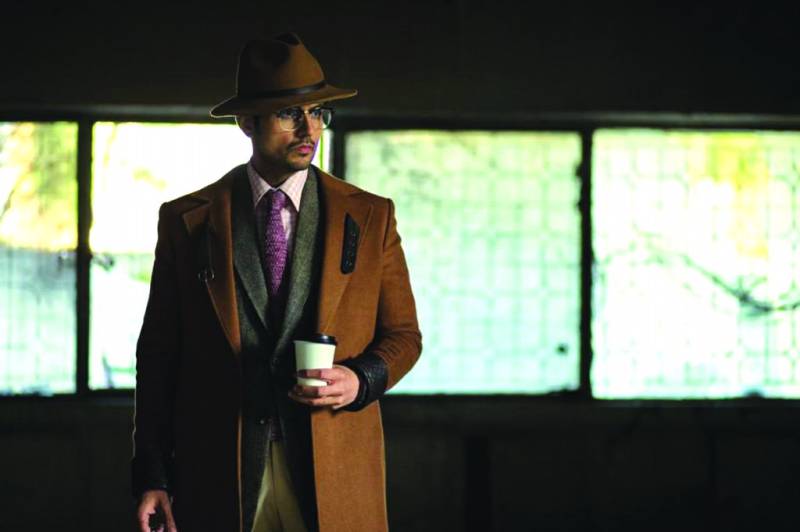
Usman Mukhtar is a fresh sensation in the Pakistani drama and film industry, known for gracefully handling the roles he is given. Although a director himself with his film Bench screened at multiple international film festivals, Usman has hitherto made short parallel films only, winning the hearts of Pakistanis mostly through his acting talent in the films Janaan and Parchi and the drama serials Anaa and Sabaat.
The Friday Times caught up with the actor, model and director to ask him a few questions.
Muhammad Ali: Tell us about your education.
Usman Mukhtar: I personally wanted to go to a film school, which unfortunately I couldn’t. All the same, a degree was important and therefore I obtained one in Mass Communication from the University of Punjab.
M.A.: How did you enter the Pakistani showbiz industry?
U.M.: I was making short Indie films and doing theatre along. My theatre work as a performer landed me a film project. Yes, I was also receiving offers for television dramas before that but I wasn’t much interested until I did the film Parchi. It was after this film that I decided to go for dramas too, and readily accepted Anaa when offered by HUM TV.
M.A.: We have seen you work as a model, as a director and as an actor. Which of these is your real calling?
U.M.: Direction, undoubtedly! It is something that I love and I wish to pursue properly.
M.A.: Do you believe that making short films and music videos is an extremely difficult task, for one has to tell a complete story within two to three minutes? Are there any directors who have acted as inspirations for you?
U.M.: If the music video is showcasing a performance alone, it isn’t very difficult. But yes, if it is narrative based, it definitely demands extra effort for condensing a meaningful story into a few minutes. The same goes for short films, which require more hard-work in comparison to feature films which give you the margin to narrate a story within two hours. Talking about inspirations, I am a huge fan of Martin Scorsese, specifically his first short film, The Big Shave. Apart from that, Quentin Tarantino and Anurag Kashyap inspire me a lot. Among Pakistani directors, I really admire the work of Kamal Khan, Mehreen Jabbar and Shoaib Mansoor.
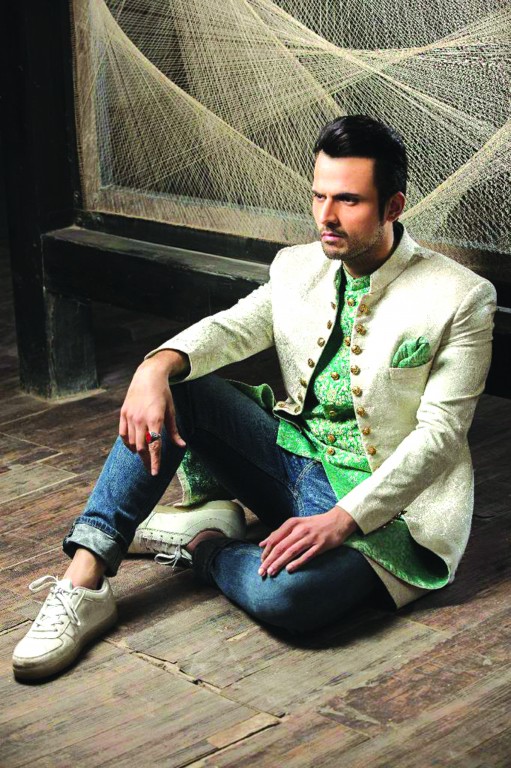
M.A.: A few Pakistani directors such as Mehreen Jabbar wish to bring back the culture of teleplays and short films. Do you wish to make any such effort and being your directorial work to the television?
U.M.: Yes, I do wish to bring my directorial work to the television, but not in the form of drama serials. That is a technique of story-telling which I believe is not meant for me.
M.A.: We have mostly seen you in coy and elegant roles in drama serials. Is it by chance or is it a deliberate choice?
U.M.: It is only in drama serials that I have taken up poised roles, for I had already played a lot of goofy characters on stage and in short films, so much so that I started to get labelled as a comedian. It was to remove this tag that I took up serious drama serials, and accordingly, soft roles.
M.A.: What do you think makes it easier for one to enter the showbiz industry; talent, good looks or connections? What has been your major struggle and which project of yours do you think gave you your breakthrough?
U.M.: Luck and looks matter for sure. Talent also comes into play to some extent. I can’t say much about connections but socialization and the ability to initiate conversations do indeed click with directors at times, and they may remember you as a confident and eloquent person. Talking about my struggle, I never wanted to do commercial work and therefore, until I did Anaa, I didn’t receive much recognition. Anaa, definitely, acted as my breakthrough.
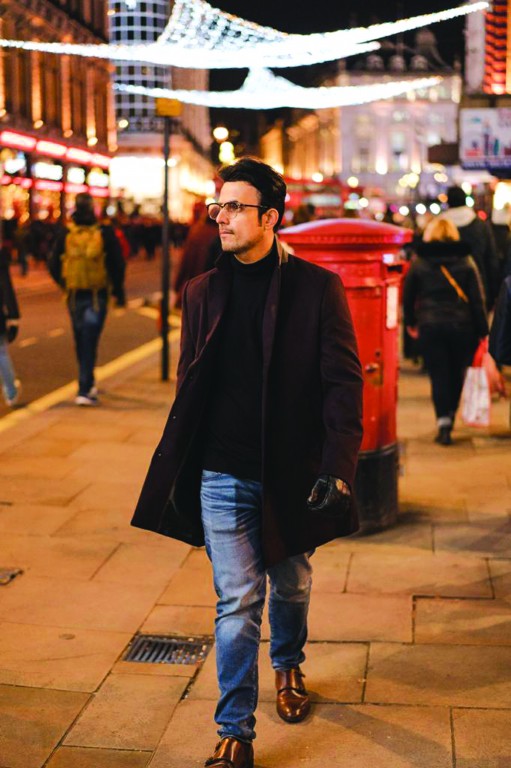
M.A.: A director is essentially a story-teller. What is your main perspective while telling a story through a film?
U.M.: I just do not like going over the top. My aim is to tell realistic stories – those which have an organic touch to them. Other than that, I would love to make something in the sci-fi genre, but that might take a very long time.
M.A.: Being a director yourself, is it difficult for you to work under other directors? Do you mull things over or do you compromise? Which has been your personal favourite project from amongst Parchi, Janaan, Anaa and Sabaat?
U.M.: Being a director, I also know how annoying it is when someone else tries to tell you what your job is. This is the reason why I suppress the director in me while working with others. I respect the people I work under and give them complete margin to execute the story the way they deem perfect. As for my favourite project, it’s Anaa.
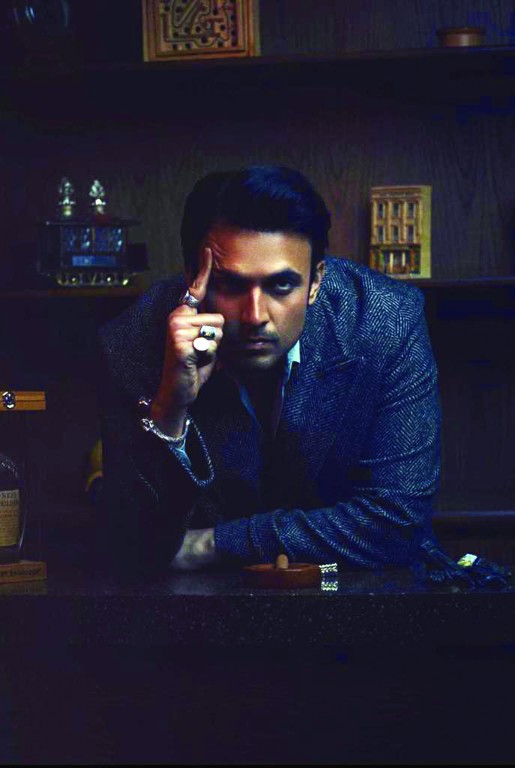
M.A.: What kind of stuff – written, visual or oral – inspires you to create?
U.M.: I am a huge fan of super-hero comic books! Sci-fi fantasy is something I would go for without giving it a second thought.
M.A.: How do you handle negative criticism?
U.M.: If it’s constructive negative criticism, I would love to take it because it would help me grow, I believe. I also tell my peers to accept it for better learning. In opposition to that, trolling is something I get annoyed at, as it does not serve any purpose.
M.A.: Most of your directorial works such as Aasiqi, The Whistle Song and Kali Santro have a dark, dusty greenish on-screen look. Does that carry a specific idea behind it?
U.M.: I personally like such grading that’s dark and grungy. You can call it my preferred style of cinematography.
M.A.: What are your upcoming projects?
U.M.: I can’t reveal anything about the upcoming projects at the moment.
M.A.: Will your dream project be as a director or as a performer? And what would it be?
U.M.: My dream project will be as a director, and most probably a super-hero film. I am just waiting for the right time.
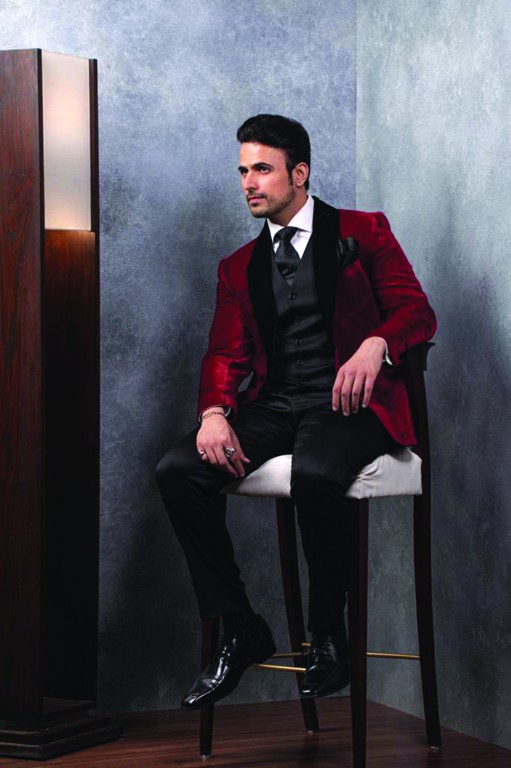
M.A.: What are your hobbies apart from reading books? How do you spend your free time?
U.M.: I was always an introvert, and have become even a stronger one owing to Covid-19. It is only for work that I go out and then come back to spend time with my family; my mother, my sister and my niece. When I don’t do that, I indulge myself in gaming. Apart from this, I also spend time with my pets and plants. Gardening is something I have lately developed a lot of interest in, and have therefore been planting many trees in my house.
M.A.: With the popularity of Sabaat and your character in it, do you think you will grow more conscious of the roles you choose in future, or will you consider Sabaat just as one of the many projects of a creative artist?
U.M.: Yes, Sabaat has taught me that I need to be more careful with the projects I sign up for. This is one thing that has definitely changed after doing this serial.
Muhammad Ali is an M.Phil scholar and a former visiting lecturer at GCU, Lahore. His interest lies in indigenous literature, the specific research areas being the Partition novel, Environmental Literature emerging from South Asia and classical and contemporary Pakistani television drama. His research on Sahira Kazmi’s “Zaib un Nisa” which was a part of his graduation thesis has been presented on various platforms including Olomopolo Media. This interview is a part of a series of interviews in which various Pakistani celebrities including writers, actors and directors will be asked questions regarding their professional work. The writer can be reached at m.ali_aquarius85@yahoo.com.
Ameena Saiyid announces the formal launch of a new Pakistani Publishing Company: Lightstone Publishers
Karachi, 20 October 2020: “Now schools in Pakistan will have textbooks that are world-class and yet affordable and based on the Pakistani context, values, history and culture and cover our curriculum. Lightstone school textbooks are low-cost, high quality in content, design and production, and readily available throughout Pakistan.”
These thoughts were expressed by Ameena Saiyid OBE, SI, Publisher and Managing Director Lightstone Publishers at its launch event at a local hotel in Karachi. The event was attended by heads of almost 100 leading schools from Karachi and was live streamed on Facebook. The arrival of a new world class Pakistani owned publisher will provide a much-needed boost to the habit of reading and writing.
Keynote speaker Saadia Mirza, Director, Lightstone Publishers said “Lightstone Publishers support schools, pupils, and teachers in Pakistan and Pakistani schools in the Middle East by publishing in all the core subjects such as English language and reading, Urdu language and reading, Social Studies, Maths, Science, Grammar, and Information Technology. Lightstone Publishers organize face-to-face and online teacher training and provide Teachers’ Guides and Lesson Plans and online and face-to-face teacher training. Lightstone Publishers partner with Sabaq/ Muse to provide educational digital resources. As Singapore is recognized as the world leader in maths and science, we have made alliances with leading Singapore publishers to adapt and publish the courses in maths and science. We are also collaborating with Cambridge University Press.
Nadia Ghani, Publishing Director, Lightstone Publishers, announced the publication of some ground-breaking general books, both fiction and non-fiction, by authors including Tariq Khosa, General Fida Hussain Malik, Liaquat Merchant, Professor Sharif ul Mujahid, Sherry Rehman, Fouzia Saeed, Ambassador Abdul Basit, and a new novel by Irshad Abdul Kadir. Lightstone has published the first book on Covid-19 in Pakistan edited by Huma Baqai and Nausheen Wasi. Nadia said that, “as books from India can no longer be imported, Lightstone Publishers will be filling the void of publishing quality fiction by Pakistani writers.”
The chief guests were the famous singer and educationist Shehzad Roy, Abbas Hussain of the Teachers’ Development Centre and founding member of SPELT, and Amin Hashwani of the Charter for Compassion.
The Friday Times caught up with the actor, model and director to ask him a few questions.
Muhammad Ali: Tell us about your education.
Usman Mukhtar: I personally wanted to go to a film school, which unfortunately I couldn’t. All the same, a degree was important and therefore I obtained one in Mass Communication from the University of Punjab.
M.A.: How did you enter the Pakistani showbiz industry?
U.M.: I was making short Indie films and doing theatre along. My theatre work as a performer landed me a film project. Yes, I was also receiving offers for television dramas before that but I wasn’t much interested until I did the film Parchi. It was after this film that I decided to go for dramas too, and readily accepted Anaa when offered by HUM TV.
M.A.: We have seen you work as a model, as a director and as an actor. Which of these is your real calling?
U.M.: Direction, undoubtedly! It is something that I love and I wish to pursue properly.
M.A.: Do you believe that making short films and music videos is an extremely difficult task, for one has to tell a complete story within two to three minutes? Are there any directors who have acted as inspirations for you?
U.M.: If the music video is showcasing a performance alone, it isn’t very difficult. But yes, if it is narrative based, it definitely demands extra effort for condensing a meaningful story into a few minutes. The same goes for short films, which require more hard-work in comparison to feature films which give you the margin to narrate a story within two hours. Talking about inspirations, I am a huge fan of Martin Scorsese, specifically his first short film, The Big Shave. Apart from that, Quentin Tarantino and Anurag Kashyap inspire me a lot. Among Pakistani directors, I really admire the work of Kamal Khan, Mehreen Jabbar and Shoaib Mansoor.

M.A.: A few Pakistani directors such as Mehreen Jabbar wish to bring back the culture of teleplays and short films. Do you wish to make any such effort and being your directorial work to the television?
U.M.: Yes, I do wish to bring my directorial work to the television, but not in the form of drama serials. That is a technique of story-telling which I believe is not meant for me.
“I had already played a lot of goofy characters on stage and in short films, so much so that I started to get labelled as a comedian. It was to remove this tag that I took up serious drama serials, and accordingly, soft roles”
M.A.: We have mostly seen you in coy and elegant roles in drama serials. Is it by chance or is it a deliberate choice?
U.M.: It is only in drama serials that I have taken up poised roles, for I had already played a lot of goofy characters on stage and in short films, so much so that I started to get labelled as a comedian. It was to remove this tag that I took up serious drama serials, and accordingly, soft roles.
M.A.: What do you think makes it easier for one to enter the showbiz industry; talent, good looks or connections? What has been your major struggle and which project of yours do you think gave you your breakthrough?
U.M.: Luck and looks matter for sure. Talent also comes into play to some extent. I can’t say much about connections but socialization and the ability to initiate conversations do indeed click with directors at times, and they may remember you as a confident and eloquent person. Talking about my struggle, I never wanted to do commercial work and therefore, until I did Anaa, I didn’t receive much recognition. Anaa, definitely, acted as my breakthrough.

M.A.: A director is essentially a story-teller. What is your main perspective while telling a story through a film?
U.M.: I just do not like going over the top. My aim is to tell realistic stories – those which have an organic touch to them. Other than that, I would love to make something in the sci-fi genre, but that might take a very long time.
“Being a director, I also know how annoying it is when someone else tries to tell you what your job is. This is the reason why I suppress the director in me while working with others”
M.A.: Being a director yourself, is it difficult for you to work under other directors? Do you mull things over or do you compromise? Which has been your personal favourite project from amongst Parchi, Janaan, Anaa and Sabaat?
U.M.: Being a director, I also know how annoying it is when someone else tries to tell you what your job is. This is the reason why I suppress the director in me while working with others. I respect the people I work under and give them complete margin to execute the story the way they deem perfect. As for my favourite project, it’s Anaa.

M.A.: What kind of stuff – written, visual or oral – inspires you to create?
U.M.: I am a huge fan of super-hero comic books! Sci-fi fantasy is something I would go for without giving it a second thought.
M.A.: How do you handle negative criticism?
U.M.: If it’s constructive negative criticism, I would love to take it because it would help me grow, I believe. I also tell my peers to accept it for better learning. In opposition to that, trolling is something I get annoyed at, as it does not serve any purpose.
M.A.: Most of your directorial works such as Aasiqi, The Whistle Song and Kali Santro have a dark, dusty greenish on-screen look. Does that carry a specific idea behind it?
U.M.: I personally like such grading that’s dark and grungy. You can call it my preferred style of cinematography.
M.A.: What are your upcoming projects?
U.M.: I can’t reveal anything about the upcoming projects at the moment.
M.A.: Will your dream project be as a director or as a performer? And what would it be?
U.M.: My dream project will be as a director, and most probably a super-hero film. I am just waiting for the right time.

M.A.: What are your hobbies apart from reading books? How do you spend your free time?
U.M.: I was always an introvert, and have become even a stronger one owing to Covid-19. It is only for work that I go out and then come back to spend time with my family; my mother, my sister and my niece. When I don’t do that, I indulge myself in gaming. Apart from this, I also spend time with my pets and plants. Gardening is something I have lately developed a lot of interest in, and have therefore been planting many trees in my house.
M.A.: With the popularity of Sabaat and your character in it, do you think you will grow more conscious of the roles you choose in future, or will you consider Sabaat just as one of the many projects of a creative artist?
U.M.: Yes, Sabaat has taught me that I need to be more careful with the projects I sign up for. This is one thing that has definitely changed after doing this serial.
Muhammad Ali is an M.Phil scholar and a former visiting lecturer at GCU, Lahore. His interest lies in indigenous literature, the specific research areas being the Partition novel, Environmental Literature emerging from South Asia and classical and contemporary Pakistani television drama. His research on Sahira Kazmi’s “Zaib un Nisa” which was a part of his graduation thesis has been presented on various platforms including Olomopolo Media. This interview is a part of a series of interviews in which various Pakistani celebrities including writers, actors and directors will be asked questions regarding their professional work. The writer can be reached at m.ali_aquarius85@yahoo.com.
Ameena Saiyid announces the formal launch of a new Pakistani Publishing Company: Lightstone Publishers
Karachi, 20 October 2020: “Now schools in Pakistan will have textbooks that are world-class and yet affordable and based on the Pakistani context, values, history and culture and cover our curriculum. Lightstone school textbooks are low-cost, high quality in content, design and production, and readily available throughout Pakistan.”
These thoughts were expressed by Ameena Saiyid OBE, SI, Publisher and Managing Director Lightstone Publishers at its launch event at a local hotel in Karachi. The event was attended by heads of almost 100 leading schools from Karachi and was live streamed on Facebook. The arrival of a new world class Pakistani owned publisher will provide a much-needed boost to the habit of reading and writing.
Keynote speaker Saadia Mirza, Director, Lightstone Publishers said “Lightstone Publishers support schools, pupils, and teachers in Pakistan and Pakistani schools in the Middle East by publishing in all the core subjects such as English language and reading, Urdu language and reading, Social Studies, Maths, Science, Grammar, and Information Technology. Lightstone Publishers organize face-to-face and online teacher training and provide Teachers’ Guides and Lesson Plans and online and face-to-face teacher training. Lightstone Publishers partner with Sabaq/ Muse to provide educational digital resources. As Singapore is recognized as the world leader in maths and science, we have made alliances with leading Singapore publishers to adapt and publish the courses in maths and science. We are also collaborating with Cambridge University Press.
Nadia Ghani, Publishing Director, Lightstone Publishers, announced the publication of some ground-breaking general books, both fiction and non-fiction, by authors including Tariq Khosa, General Fida Hussain Malik, Liaquat Merchant, Professor Sharif ul Mujahid, Sherry Rehman, Fouzia Saeed, Ambassador Abdul Basit, and a new novel by Irshad Abdul Kadir. Lightstone has published the first book on Covid-19 in Pakistan edited by Huma Baqai and Nausheen Wasi. Nadia said that, “as books from India can no longer be imported, Lightstone Publishers will be filling the void of publishing quality fiction by Pakistani writers.”
The chief guests were the famous singer and educationist Shehzad Roy, Abbas Hussain of the Teachers’ Development Centre and founding member of SPELT, and Amin Hashwani of the Charter for Compassion.

